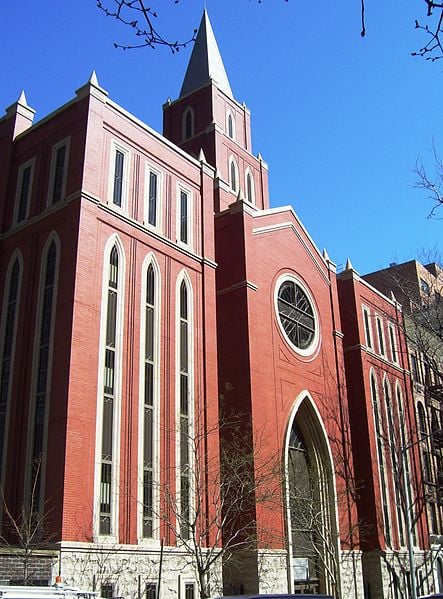
(Wikimedia Commons public domain image)
I offer a few more items from Paul McFate, 52 Good Reasons to Go to Church, Besides the Obvious Ones (Chicago: ACTA Publications, 2004) — a little book or booklet that I commend to you (though it may be hard to find). Every single one of them is board-certified as appropriate for inclusion in your Christopher Hitchens Memorial “How Religion Poisons Everything” File:
- Fewer Children Impacted by Divorce (page 51) — Many studies — e.g. an article (unidentified by McFate) that was published in 1984 in the Review of Religious Research — have shown that church attendance has a positive effect on marriages and significantly reduces rates of divorce. This is significant, because divorce has serious long-term adverse effects on children. For instance, a 1995 study conducted in Great Britain followed 17,414 babies born in 1958 until they were twenty-three years of age. Children whose parents divorced when they were between the ages of seven and sixteen proved 36% more likely than the control group to have psychological problems by the time they reached the age of 23. Children whose parents divorced before they were seven were 58% more likely to have psychological problems. [P. L. Chase-Lansdale, A. J. Cherlin, and K. E. Kiernan, “The Long-Term Effects of Parental Divorce on the Mental Health of Young Adults: A Developmental Perspective,” Child Development 66 (1995): 1614-1634; E. F. Filsinger and M. R. Wilson, “Religiosity, Socioeconomic Rewards, and Family Development: Predictors of Marital Adjustment,” Journal of Marriage and the Family 46 (1984): 663-670.]
- Easier School Adjustment and Less Peer Pressure (page 52) — A study published in 1987 “showed that among eleventh and twelfth graders, identifying with religious beliefs was positively related to strong family relationships and the ability to adjust well in school. The study also showed that these qualities are negatively associated with peer pressure related to drug abuse.” [E. R. Oetting and F. Beauvais, “Peer Cluster Theory, Socialization Characteristics, and Adolescent Drug Use: A Path Analysis,” Journal of Counseling Psychology 34 (1987): 205-213]
- Better Maternal Influence (page 53) — A study of 1553 teenagers (ranging from twelve through fourteen years of age) found that children of religious mothers were less likely to use alcohol. Interestingly, only mothers who attended church had a significant effect on their children’s use of alcohol; mothers who thought religion important but did not regularly attend services had only a negligible effect in this regard, if any effect at all. [V. A. Foshee and B. R. Hollinger, “Maternal Religiosity, Adolescent Social Bonding, and Adolescent Alcohol Use,” Journal of Early Adolescence 16 (1996): 451-468.]
- Blessings for Those Who Pray (page 54) — A 1997 article reported findings on the power of intercessory prayer regarding anxiety, depression, and self-esteem. The underlying study divided 406 adults into a subject (prayed-for) group and a control (not prayed-for) group. Ninety other adults were asked to pray for the subjects. There were very positive results for the subject group. Moreover, those who prayed for the subject group themselves reported improvements in health. [S. Alar, “An Experimental Study of the Effects of Distant, Intercessory Prayer on Self-Esteem, Anxiety, and Depression,” Alternative Therapies in Health and Medicine 3/6 (1997): 38-53]
I’ve previously mentioned how much I myself, a frankly rather asocial animal who has been basically enjoying coronavirus-imposed social distancing, value the social ties involved in, and spun off by, my own church attendance. Last week, we attended a theatrical showing of Indiana Jones and the Last Crusade. It had been longer than I had thought since I had seen it, and my wife and I both enjoyed it more than we had expected. This was made possible because friends of ours had rented the theater for themselves, their children, and their grandchildren and then invited us to join them. Now, I understand that, in my case, a few will be mentally redefining the word friend to mean “someone who doesn’t yet actually know him.” But here, at least, that won’t work: The couple who kindly invited us are former down-the-street neighbors and ward members; he is our former bishop. They’ve known us for years. This is one of many relationships that our shared membership in a religious congregation has made possible and available to us.












